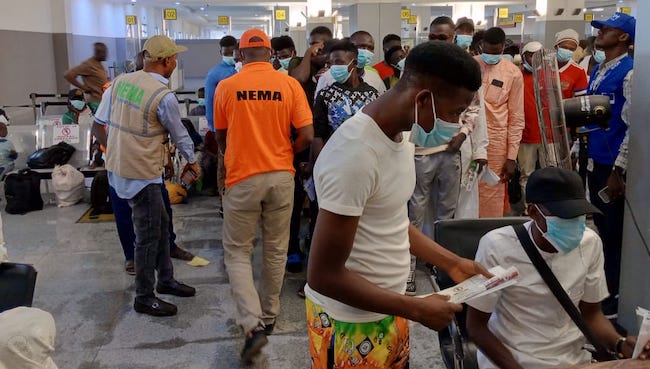The pre-dawn hours of Tuesday witnessed the arrival of 390 Nigerian migrants at the Nigeria Immigration Training School in Kano, marking another chapter in the ongoing repatriation efforts spearheaded by the Nigerian government. This group, comprised primarily of adult males (387), along with two women and one infant, were brought back from Niamey, Niger Republic, where they had been stranded. Their return underscores the Nigerian government’s commitment to assisting its citizens abroad who find themselves in vulnerable situations and facilitating their safe passage back home. This repatriation follows a similar effort in December 2024, where a larger group of 702 stranded Nigerians were also returned from Niger. The consistent efforts demonstrate a proactive approach towards addressing the challenges faced by Nigerian migrants in the region.
The repatriation operation was a collaborative endeavor involving multiple agencies working in concert to ensure the safe and efficient return of these individuals. The Nigerian Mission in Niamey played a pivotal role in organizing the operation, partnering with the International Organisation for Migration (IOM), which has extensive experience in facilitating such movements across borders. The IOM’s involvement ensured adherence to international standards and best practices in migration management, contributing to the smooth execution of the repatriation process. The combined expertise of the Nigerian Mission and the IOM proved crucial in navigating the logistical complexities of transporting such a large group across international borders, providing them with necessary support during their journey, and ultimately ensuring their safe arrival back in Nigeria.
Upon arrival in Kano, the returnees were immediately processed by officials from the National Commission for Refugees, Migrants, and Internally Displaced Persons (NCFRMI) and the Nigeria Immigration Service. This involved registration and profiling procedures, crucial steps for documenting their return and ensuring their eligibility for the various reintegration programs offered by the government. This meticulous documentation process serves not only to keep track of the returnees, but also to tailor appropriate support and assistance based on their individual needs and circumstances. It lays the foundation for the subsequent reintegration phase, where these individuals will receive aid to reestablish themselves back in Nigerian society.
The Federal Commissioner of the NCFRMI, Tijjani Ahmed, reiterated the government’s dedication to the returnees’ successful reintegration, emphasizing the various empowerment programs available under President Bola Tinubu’s “Renewed Hope” agenda. These programs aim to provide returnees with the necessary skills, resources, and opportunities to rebuild their lives and contribute to their communities. This commitment highlights a broader strategy that extends beyond simply bringing citizens back home, focusing on equipping them with the tools they need to achieve self-sufficiency and become productive members of society. The “Renewed Hope” agenda serves as the framework for this reintegration strategy, emphasizing the government’s commitment to uplifting and empowering all its citizens.
Commissioner Ahmed, represented by the Kano State Field Coordinator, Hajiya Liman, highlighted the significance of this particular repatriation as the third batch of returnees from Niger Republic in the ongoing voluntary return initiative that commenced in 2024. The consistent nature of these operations indicates a concerted and sustained effort by the government to address the issue of stranded Nigerians abroad. The voluntary nature of the return is also notable, underscoring the agency and choice afforded to the migrants themselves in deciding to return to their home country. This aspect reflects a respectful and humane approach to migration management, prioritizing the individuals’ decisions and well-being.
The successful execution of this repatriation operation underscores the importance of interagency collaboration and the effectiveness of a well-coordinated approach. The combined efforts of the Nigerian Mission in Niamey, the IOM, the NCFRMI, and the Nigeria Immigration Service ensured the smooth and efficient return of these 390 Nigerians. Their commitment and cooperation played a pivotal role in ensuring the safety and well-being of the returnees throughout the process, demonstrating the positive impact that coordinated efforts can have on addressing complex migration challenges. The success of this operation serves as a model for future repatriation efforts, highlighting the effectiveness of a multi-agency approach in managing such sensitive and complex operations.


